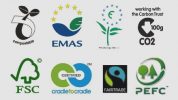Eco-labels and Voluntary Sustainability Standards that uphold the sustainability of products from developing countries can be the key to unlocking new markets, according to a new United Nations report.
The report will be launched at the International Convention on Sustainable Trade and Standards, organized by the Quality Council of India (QCI) and the United Nations Forum on Sustainability Standards, in New Delhi, India, on 17–18 September.
“Today, there are almost 500 eco-labels in 199 countries and 25 industrial sectors,” UNCTAD Deputy Secretary General Isabelle Durant said.
“With broad uptake, standards can move industries towards improved social, environmental and economic performance. Standards translate the broad concept of sustainability into specific and concrete measures for companies and their suppliers and influence consumption decisions of the consumers,” she said.
Ecolabelling is a voluntary method of environmental performance certification and labelling that is practised around the world. An ecolabel identifies products or services proven environmentally preferable overall, within a specific product or service category.
The UNFSS is a knowledge-sharing and convening platform backed by UNCTAD and the Food and Agriculture Organization of the United Nations (FAO), the International Trade Centre (ITC), the United Nations Environment Program (UN Environment) and the United Nations Industrial Development Organization (UNIDO).
The report will be launched on 17 September.

